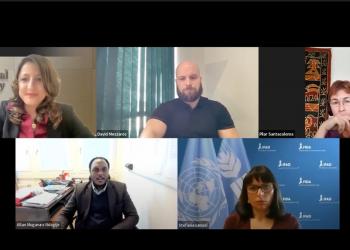BIC event explores the role of partnerships in addressing food security
The Baha’i International Community’s (BIC) United Nations office in Geneva hosted, May 4, an official side-event during the 7th United Nations (UN) Multi-Stakeholder Forum on Science, Technology and Innovation for the Sustainable Development goals (SDGs), bringing together representatives from the government sector, the UN and the private sector. The panel, titled Progress through Partnerships: How can private sector partnerships assist in achieving SDG 2?, explored how the concept of collaboration and partnership between government institutions, individuals, communities and the private sector are key to addressing food security issues and other SDGs.
“While the need for ending inequalities in its many forms is readily recognized,” said Simin Fahandej, a BIC Representative to the UN in her introductory remarks, “the solutions are often based on fragmented conceptions of the relationship between the various sectors in society such as governmental institutions, individuals, communities, the private sector and civil society organizations.”
Referring to the “growing challenges” facing governments and communities, Ms. Fahandej continued, “we might ask how would global challenges be more effectively resolved if we could adopt a new and evolved understanding of the relationships between these actors, and if the vision that shaped our thinking of these relationships was one of collaboration and true and genuine partnerships in addressing current global problems, particularly food security?”
The event explored, in particular, how partnerships with the private sector—an essential stakeholder in achieving the goals in the 2030 agenda, given its scope and impact—can contribute to progress towards SDG 2 on achieving zero hunger in the world.
“The most important thing in the partnership is creating trust,” said Pilar Santacoloma, Nutrition and Food Systems Officer at the UN’s Food and Agriculture Organization (FAO), during her remarks, and that “transparency, data and the facts are essential tools to achieve this.”
Allan Mugarura, Third Secretary at the Permanent Mission of the Republic of Uganda to the UN in Geneva, suggested that, equipped with these tools, organizations working in regions such as sub-Saharan Africa may face other challenges as they discover a disparity between what they are trying to achieve and the local reality. “Projects [need] to be more aligned with societal needs, by bringing benefactors on board with interventions,” he said.
The BIC’s food security contributions therefore try to suggest that, given the multi-faceted nature of today’s challenges, collaboration between the various sectors in society is not only necessary but a requirement in effectively tackling the SDGs, particularly food security.
Stefania Lenoci, head of the Private Sector Advisory and Implementation Unit at the International Fund for Agricultural Development (IFAD), also said the FAO has created a private sector arm of the institution, where investments are made into local private sector and financial institutions which directly work with rural populations, particularly women and youth.
“It’s not a secret to anyone that the private sector is an important engine of growth in developing countries,” said Ms. Lenocy. “And the role of the private sector is essential to achieving agenda 2030 … the private sector is the main engine for enterprise development, for creating jobs, for growth.” Ms. Lenoci further explained that in countries where partnership has taken place with the private sector, there has been evidence of greater economic growth.
David Meszaros, founder of SMARTKAS, an agricultural technology company that tries to improve crop yields, added that technology should be brought “to those who need it, instead of other approaches which create dependency towards countries that provide goods or services.” The community as a whole, yet another crucial protagonist, he explained, can thus benefit from the interventions.
The Baha’i International Community plans to build on this conversation about collaboration between institutions, communities, individuals and the private sector and their role in achieving the SDGs. Bringing together different protagonists in this process can reveal further insights into collaboration and partnership as it relates to food security and Agenda 2030.
